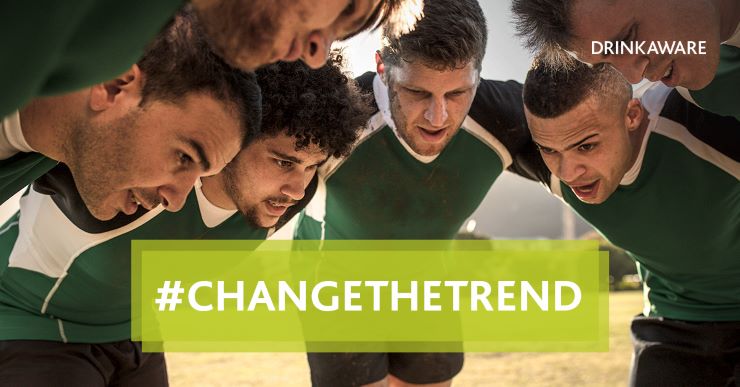The 2019 Drinkaware Index report revealed that men in Ireland, particularly under-34s, are exhibiting consistent hazardous and potentially harmful drinking patterns. In response to these findings, during Men’s Health Week, Drinkaware, the national not-for-profit organisation working to reduce alcohol misuse, is calling for young men in Ireland to make more informed choices around alcohol and improve long-term health and wellbeing through new campaign ‘Change the Trend’.
Research from the 2019 Drinkaware Index report has today revealed that 52% of under-34s who drink alcohol, binge drink on a weekly basis, compared to the 18% national average. Furthermore, 29% of male drinkers believe their drinking habits may cause future health problems, compared to 19% of female drinkers.
The new Drinkaware ‘Change the Trend’ campaign aims to improve the health and wellbeing of Irish young men who drink by (i) reducing their incidence of binge drinking, (ii) decreasing the number who drink above the HSE weekly low-risk guideline – 17 standard drinks, spread out over the week with at least two alcohol-free days – and iii) raising awareness of the guidelines and what a standard drink is. The new evidence-based campaign will provide facts, advice and tools to empower men to understand and make positive choices around their drinking habits.
GENDER COMPARISONS
- On average, Irish men who drink, binge drink almost twice a month – 22 times in a year – versus women who do so 10 times a year.
- Of Irish men who drink, one-in-four (26%) binge drink on a weekly basis, compared to only 10% of women.
- Men are twice as likely to feel that they should cut down on their drinking (28%), compared to 14% of women.
- Men are more likely to drink as a coping mechanism (56%) than women (46%).
- 29% of Irish male drinkers believe they are likely to experience future health problems if they continue to drink at their current levels, compared to 19% of female drinkers.
UNDER-34S COMPARED TO OVERALL DRINKING POPULATION
- Under-34s binge drink three times more often in a year than the overall drinking population – 43 times in a year vs 16 times respectively.
- 52% of under-34s who drink alcohol, binge drink on a weekly basis, compared to the 18% national average.
- One-third (32%) of 18-24-year-olds and a quarter (25%) of 25-34-year-olds who drink, believe they should cut down on their drinking vs 21% of the overall drinking population.
- Adults aged 18-24 (64%) and 25-34 (58%) are significantly more likely to drink as a coping mechanism than the national average of 51%.
- Over half (52%) of under 34-year-olds feel they may experience future health problems if they maintain current drinking levels, compared to a quarter (24%) of the overall Irish drinking population.
Commenting, Sheena Horgan, CEO of Drinkaware, said:
“The Drinkaware Index research makes one thing clear – young people in Ireland who drink, and particularly our young men, are consistently drinking to a hazardous and potentially harmful level, which is increasing risks to long-term health and wellbeing. The report revealed stark contrasts between this critical cohort of men and those aged under-34, who exhibit consistently hazardous and potentially harmful drinking habits when compared with both women and the overall drinking population.
“Despite this, our research shows that the same young men who are drinking excessively, are also open to changing their behaviour. They know their drinking habits may cause future harm but they show a willingness to make positive changes.
“Crucially, we feel the time for shifting the dial is now. We can clearly see that the appetite for more mindful drinking in Ireland is growing. Non-alcoholic drinks and pubs are becoming a new norm, reflecting an evolving Ireland and a sober curious public. One-in-five Irish adult men and almost 37% of under-34s abstain from alcohol entirely. Over one-third of all visitors to drinkaware.ie are men, an increase from 2018.
“Through our new campaign and especially during Men’s Health Week, Drinkaware is responding to this appetite for lasting change regarding alcohol and encouraging men to take steps towards more mindful drinking for a healthier future.”


